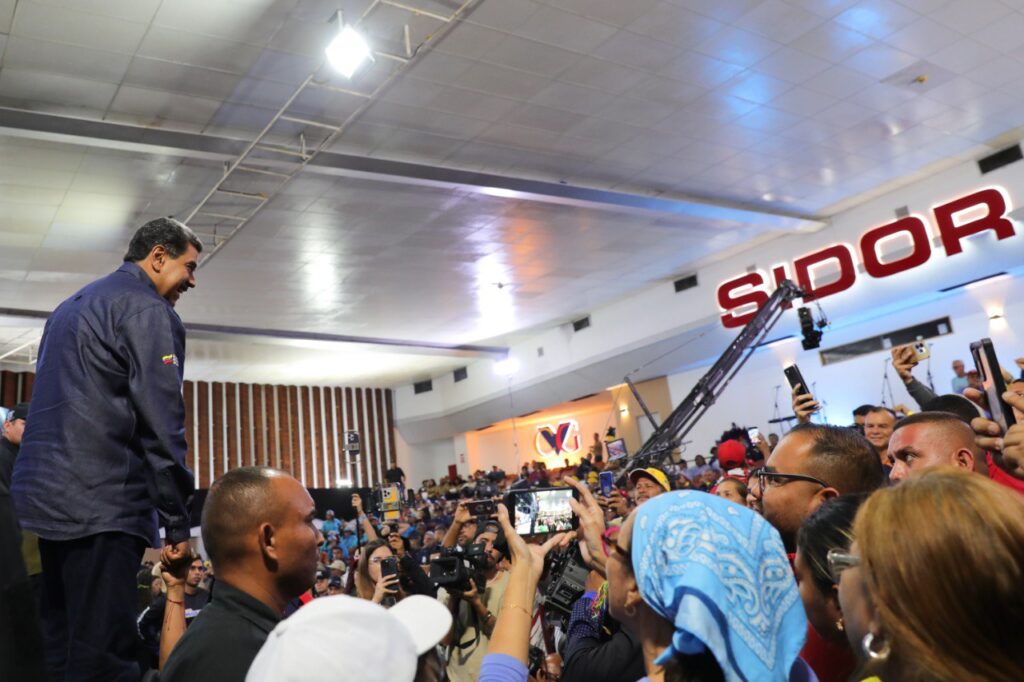Venezuelan President Announces BRICS Investments and Election Observations
Venezuelan President Nicolás Maduro addresses workers of the Orinoco Steel Company (Sidor) in Bolívar state. (Prensa Presidencial)
Mexico City, Mexico, June 18, 2024 (venezuelanalysis.com) – Venezuelan President Nicolás Maduro has announced significant investment commitments from multiple BRICS bloc countries, thereby unlocking potential new markets for Venezuelan products.
President Maduro broke this pivotal news during his meeting with the employees of the Orinoco Steel Company (Sidor) on Monday. Speaking directly to the workers of SIDOR—a state-owned steelmaking enterprise that has recently faced significant labor disputes—Maduro stated, “I have already secured sufficient investments to make the company stronger and more powerful moving forward.”
Founded in 1953 and nationalized by the Hugo Chávez administration in 2008, Sidor has grappled with the severe economic crises and U.S. sanctions on Venezuela. The workers have mounted numerous protests and actions advocating for their labor rights and the discontinuation of protest criminalization. Leftist organizations have condemned the imprisonment of union leaders like Leonardo Azócar and Daniel Romero, who have now spent over a year in custody.
Maduro further addressed the labor conflicts in Venezuela’s heavy industries, indicating that the government had been actively working behind the scenes to address worker grievances. He assured that “We will advance the full recovery of all contractual rights of workers and companies in the months to come,” during his weekly televised program from the state of Bolívar.
As he campaigns for re-election, Maduro contrasted his administration’s economic strategy with that of the right-wing opposition. “There are two visions, two models here: ours, based on sovereignty and productive recovery, and theirs, focused on looting and privatizing,” he asserted.
Vice Minister for Latin America, Rander Peña, indicated that Venezuela had extended an invitation to the 20-country BRICS+ bloc—including global heavyweights like China and Russia—to observe the upcoming election on July 28. He reiterated the nation’s ambition to join the multilateral organization in the near future. “Venezuela aspires to become a full member of the BRICS+ this year. Our country has potentials to contribute significantly as a member,” Peña emphasized.
Venezuelan Foreign Minister Yván Gil, during a recent visit to Russia, also expressed the country’s intent to become the second Latin American nation to join BRICS. Russian Foreign Minister Sergey Lavrov has previously voiced Moscow’s support for Venezuela’s membership bid.
On his visit to China, President Maduro announced an upgrade in bilateral relations, establishing an “all-weather strategic partnership,” making Venezuela the first Latin American country to achieve this high-level diplomatic status.
The inclusion of the BRICS+ countries as election observers follows a decision by Venezuela’s National Electoral Council (CNE) to rescind its invitation to the European Union (EU) for an observation mission, citing the EU’s continued sanctions against the country.
Opposition candidate Edmundo González, seen as a surrogate for far-right leader María Corina Machado, recently rejected Maduro’s proposal for all candidates to pledge recognition of the election results, regardless of the outcome. Although the official campaign period has not commenced, candidates have been energetically staging rallies.
Machado, disqualified from the ballot after her political ban was upheld by Venezuela’s Supreme Court in January, has continued to actively campaign, leading to speculation about her potential disqualification. At a recent rally, she addressed the crowd as if she were the candidate, saying, “When I am president of Venezuela, I will also be their [political opponents’] president. I’m going to be the president of everyone,” as reported by venezuelanalysis.com.
The opposition’s campaign faces another challenge with the looming loss of Venezuela’s key foreign asset, CITGO. A U.S. court-mandated sale has progressed further, with the hardline opposition, which has controlled CITGO since 2019, widely blamed for the impending change in ownership.
Venezuelan opposition leaders and allied U.S. politicians have urged the Biden administration to intervene in the CITGO auction, aiming to mitigate the political fallout ahead of the July 28 elections.
Edited by Ricardo Vaz in Caracas.
Source: venezuelanalysis.com
